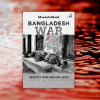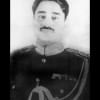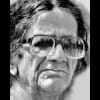30 lakh martyrs a settled history
It is an "undisputed" and "settled" fact that 30 lakh people laid down their lives during the Bangladesh's War of Liberation in 1971, says the International Crimes Tribunal-1.
"The undisputed history says that the Bengali nation and the freedom fighters fought for nine months to get their homeland Bangladesh free from the capture of Pakistani armed forces," the Tribunal said yesterday while delivering a verdict in a war crimes case.
Apart from the three million dead, hundreds of thousands of women sacrificed "their supreme honour for the cause of freeing their dear motherland Bangladesh, about ten million people took refuge in India and millions of others were internally displaced, said the special court formed in 2010 to try those accused of committing war crimes about four decades ago.
"This settled history is now indisputably mingled with the nation's holy emotion and the glory of the war of the liberation through which the nation achieved its motherland 'Bangladesh'."
The three-member Tribunal led by Justice Anwarul Haque came up with the observations at a time when a section of political leadership are raising questions about the number of the 1971 martyrs.
BNP Chairperson Begum Khaleda Zia has been sued for sedition after she on December 21 last year said, "There are controversies over how many were martyred in the Liberation War." Some other BNP leaders too have drew huge criticisms for making similar comments in support of Khaleda.
Khaleda made the remark just three weeks after Pakistan on November 30 last year denied committing any war crimes or atrocities during the nine-month war.
At the same time, the demand for trial of the Pakistani army officers involved in the crimes committed in 1971 is getting louder these days with legal experts saying that there's no legal bar to bringing them to book.
Yesterday's Tribunal verdict in the case against two Netrakona Razakars -- Obaidul Haque Taher and Ataur Rahman Nani -- was the first since Khaleda's controversial remark and Pakistan's denial.
In the judgment, the Tribunal said the atrocities committed in 1971 in Bangladesh cannot be termed as mere "force used to prevent Awami League in the then East Pakistan from coming to power".
It then cited the Appellate Division order in the review petition of executed war criminal Abdul Quader Mollah.
"These offences were perpetrated in Bangladesh following the onslaught of 'Operation Search Light' from the night following 25th March, 1971 to 16th December, 1971, by the Pakistani occupation army and their collaborators after the declaration of independence of the country by late Sheikh Mujibur Rahman. There were widespread atrocities like killing of three million people, rape, arson and looting of unarmed civilians, forcing 10 million people to take shelter in the neighbouring country, India," reads the 2013 apex court order.
The Tribunal yesterday said after the declaration of Bangladesh's independence, the Pakistani occupation army and the armed militia forces, formed to collaborate with them, started committing "barbaric [and] atrocious activities" directed at the civilians in the name of fighting the freedom fighters within the territory of Bangladesh, and made them engaged in an "intra-state war or armed conflict".
"Were those acts compatible with the notion of 'protection of civilians' in own territory during armed conflict or intra-state war or conflict as contained in the Geneva Convention or international humanitarian law or Laws of War? The answer is absolutely 'NO'," it said.
"The Pakistani occupation armed forces and their armed organs including the auxiliary forces indisputably had committed forbidden act of aggression against Bangladesh in 1971," the verdict added.
Mentioning the atrocities as undisputed facts, the tribunal said no guilty person should be allowed to go unpunished, merely for any faint doubt, particularly in a case involving crimes against humanity committed in 1971 in violation of customary international laws during the War of Liberation.
"The wheels of justice must move to halt the culture of impunity," said the judgment that awarded death to Taher and Nani for their crimes against humanity in 1971.
Justice Md Shahinur Islam and Justice Md Shohrowardi were the other members of the Tribunal bench.

 For all latest news, follow The Daily Star's Google News channel.
For all latest news, follow The Daily Star's Google News channel. 








Comments